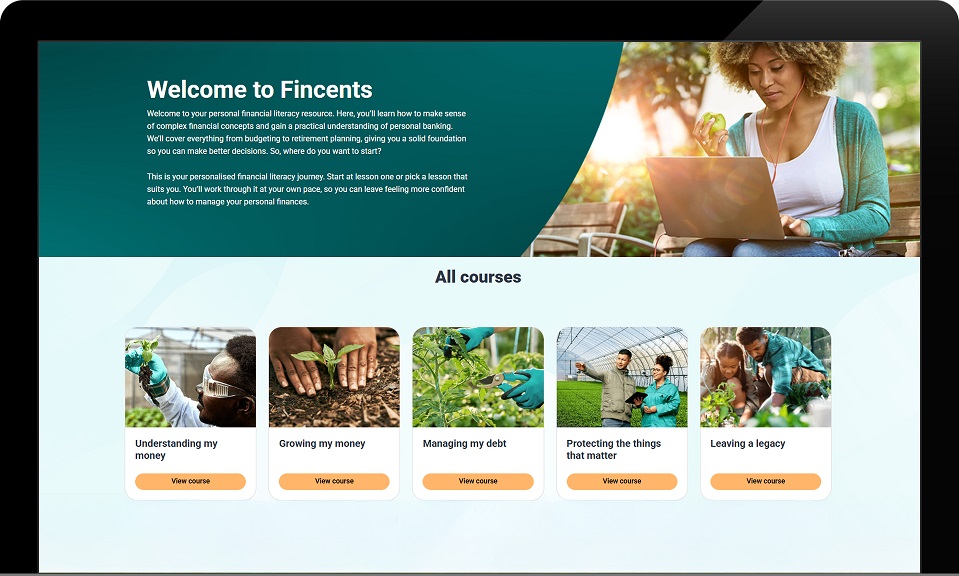FNB today announced the launch of its new online financial education hub, www.fincents.co.za, in a bid to ramp up its consumer education efforts and improve financial literacy outcomes among South African communities.
The website, which is open to all South Africans regardless of which financial institution they bank with, features free registration and access to micro learning modules, articles, videos, and other content formats to empower users with financial education.
The bank also notes that those who register for financial education on Fincents will be able to download content to allow for learning offline.
“According to the FSCA Financial Literacy Baseline Survey, 48% of South African adults struggle with basic financial literacy. And, with women and underserved communities bearing the brunt of this knowledge gap, we view it as critical for us to open up our capabilities and expertise to empower South Africans from all walks of life with potentially life-changing financial knowledge,” says FNB’s Personal Segment CEO, Lytania Johnson.
FNB’s data shows that consumers tend to have specific and apparent financial education needs such as access to content that relies less complicated financial language and terminology. Our data shows that South Africans have general fear and anxiety when it comes to the topic of personal finances. Moreover, consumer education data also shows that financial information is not always easily retained by individuals after a single interaction. As a result, to enhance knowledge retention, education efforts need to be centred on addressing these challenges in an appropriate and easily digestible manager.
“With this in mind, we have tailored the content and information available on the Fincents website to meet these requirements by offering users core financial education support. Our team tapped into its experience working in communities across the country and partnered with digital content experts to craft an interactive learning platform that allows users to learn through storytelling, quizzes, and contextual content,” says Dhashni Naidoo who is a programme manager at FNB Consumer Education.
Fincents takes users through five content pillars and 13 combined themes ranging from topics such as budgeting, saving, identifying financial scams to managing debt, and retirement planning.
“Ultimately, our aim in this knowledge transfer exercise is not only to improve financial literacy levels but also to positively and sustainably influence attitudes and perceptions about the importance of personal finances,” continues Johnson.
Over the years, FNB’s Consumer Education unit has invested in community workshops, radio outreach, and social media content.
The bank reaches over 70 000 consumers annually through its workshops, which are long format, interactive learning experiences. Additionally, FNB has extensive coverage on community, regional and vernacular radio stations, providing content in seven South African languages.
“What’s exciting about Fincents is the fact that it will allow us to empower as many South Africans as possible with accessible and interactive multimedia learning tools – something that we haven’t yet done as a bank, until now,” adds Naidoo.
With the bank set on establishing Fincents as a trusted and well-used source of financial education among a broad cross-section of the population, it also intends to provide content in various South African languages and sustainably improve financial literacy levels among users. In fact, this first phase of the website is just one of the steps FNB is taking to ensure it further develops its existing consumer education efforts.
Over time, the bank plans to enhance the website’s features and expand content areas to meet the growing financial literacy needs of consumers. “We’re actively exploring including content around additional subject areas like homeownership, vehicle finance, cryptocurrency, and more.
We also plan to include specialised content tailored to niche audiences, such as educators (for use in the classroom) and parents (for age-appropriate financial conversations with their children).” Naidoo continues.
Financial literacy is not only critical on an individual level, says Johnson, adding: “It’s also critical for families, communities, and the broader economy.
And, by opening the platform up to all South Africans, FNB hopes to be able to play a critical role in improving the quality of financial inclusion, increasing financial wellness and financial stability among vulnerable members of our communities, and empowering them to secure their financial futures.”

